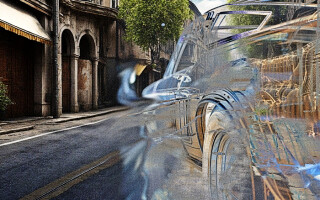Student competitions foster real-world engineering principles
October 12, 2015

The gap between the technical and practical skills employers expect graduates to possess and those the curriculum delivers is well documented in the m...
The gap between the technical and practical skills employers expect graduates to possess and those the curriculum delivers is well documented in the media. Academia and industry are searching for ways to answer the question, “How do you improve the technical and practical skills of engineering graduates to meet the needs of industry?”
One way to address this problem is to participate as a team member in a student competition. Student competitions provide an opportunity to receive hands-on experience with real-life engineering problems, like designing a car, for example. The problems presented don’t have pre-defined solutions, giving participants the opportunity to explore the design space and set the learned theory into practice, often using industry-standard tools. Equally as important, students develop the soft skills needed to hit the ground running when finally landing that first engineering job.
As the technical lead consultant for MathWorks’ automotive student competitions for the past 15 years, it’s my honor to support the EcoCAR 3 student competition. The team of engineers assembled at MathWorks is working with students to redesign a Chevrolet Camaro to reduce its environmental impact, while maintaining the muscle and performance expected by the buyers of this car. In this particular competition, students are tasked with using industry-standard development methodologies and tools, such as MATLAB and Simulink, to develop and integrate energy-efficient powertrains that maximize performance while retaining the safety and high consumer standards. The goal is to educate the next generation of engineers in the development processes utilized in their daily business practice.
By participating in competitions such as EcoCAR 3, students receive necessary practical experience, including hands-on experience with a real-world project; access to and training on how industry-standard tools can be used to solve engineering challenges – and personal motivation and the drive to succeed.
The scope and complexity of student competitions is huge. Automotive competitions, such as EcoCAR 3, include all the project components these future automotive engineers will face when entering the industry, ranging from budgeting, product planning, marketing, managing stakeholders, product design, development, and testing. Having to complete these tasks in a distributed team environment mimics potential challenges in the real world.
The tasks and challenges EcoCAR 3 teams face are similar as those of professional automotive engineers, including the ability to understand and manage the relationship between the various systems onboard the vehicle. A car’s quality and performance isn’t merely the sum of its individual technical solutions, it’s the system-level integration of a well-designed subsystem. With this in mind, the project manager’s role within a team is key. To be successful, engineers must step out of their technical comfort zone and ensure the overall project is running smoothly – often the greatest challenge for student teams. While gaining the project management skills needed for their future careers, students also are given access to and trained on industry-standard tools, like the MathWorks software, that are used to solve everyday engineering challenges.
To reinforce the core concepts of model-based design, all teams use the approach in which a virtual model is at the center of the system development. In addition, EcoCar 3 teams compete for the MathWorks modeling award. The award recognizes teams that demonstrate how they applied model-based design; from initial design and simulation to testing and implementation with MATLAB and Simulink, teams showcase how they achieved their overall competition objectives. Winners are then assessed on how well they applied the model-based design concepts using MathWorks tools, including the key areas of plant modeling, control design and tuning, data analysis, industrial grade model-based design development process elements, and lessons learned.
For example, students participating in the Ohio State EcoCAR 3 program used MathWorks software to select the proper components after learning that building a competitive vehicle starts with choosing the right parts. When selecting engines, electric machines, and battery packs, the software helped guide students to model each component and develop the optimal hybrid vehicle. Other teams, including McMaster University and the University of Washington, are using MathWorks software to solve the engineering challenges in the EcoCAR 3 competition in advanced ways that sometimes rival their industrial counterparts.
While students receive credit for some of the work completed in the EcoCAR 3 competition, the academic reward isn’t proportional to the time the typical student invests in the competition. Competing students have a passion for learning and understand that these projects can help them stand out with future recruiters.
Students are provided with the opportunity to not only apply what they learned in the classroom, but to also gain a deeper understanding of an engineer’s daily activities. It’s helpful that the object transformed through their work is the Chevy Camaro. Converting this polished design into a fuel-efficient hybrid that preserves the Camaro brand is challenging; it’s this challenge that produces immense personal satisfaction and the motivation to continue to learn, innovate, and push the boundaries of their educational experience.
This sense of achievement is all part of the project-based learning experience, in which hands-on participation coupled with real-world relevance reinforces curriculum and classroom teachings, enabling students to retain what they’ve learned longer than traditional instruction. Consequently, students who participate in project-based learning activities are better able to apply their technical and practical skills successfully to new situations, better preparing them for their future careers.
Paul Smith is the senior director of engineering services for MathWorks. He is responsible for managing a global team of engineers providing services to all MathWorks customers as they evaluate, adopt, and deploy MathWorks product solutions into their workflows. Paul has been active as a MathWorks technical lead for the Advanced Vehicle Competition series sponsored by the Department of Energy and managed by Argonne National Labs including the most recent EcoCAR series.





